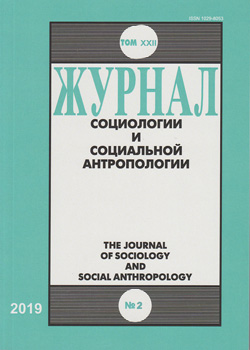Post-Colonial Approach in Media Studies and User Studies
Keywords:
mediatization; Postcolonial Studies; Media Studies; User Studies; hybridization; mediatized transculturality; digital capitalism.
Abstract
Currently, when the global media landscape is forming, different platforms or media must be studied not in the isolation, but as a network and interaction. Analyzing the use of media as a socially defined activity and as an integral part of everyday life, we encounter the problem of the local (national and regional) features of the user behavior and the difference in the local content of the global platforms. An adequate basis for solving this problem can be found in Postcolonial Studies. They give theoretical and methodological guidelines for identifying the impact of economic and cultural policies of the West on the global situation and developing a discursive-critical theory that reveals hidden forms of representation and self-representation of cultures. The study of the activities and attitudes of users in different regions of the globe demands the theoretical foundations, which would take into account (a) the nature of asymmetrical power relations of the Western world and non-European regions; (b) the hybrid character of non-Western cultures and the specific identity of their carriers; (c) heterogeneity, fragmentation, and internal inconsistency of global cultures. Critical analysis categories developed in the Postcolonial Studies (cultural inequality, discursive influence, hybridity, hybrid identity, re-mapping) can help User Studies uncover mechanisms and practices of influence and interaction of user cultures — on the one hand, identifying the determining power of hegemonic cultures, and on the other, exploring the normativization of the self-representations of previously dependent communities.
Published
2019-09-20
How to Cite
Gafarova, J. (2019). Post-Colonial Approach in Media Studies and User Studies. ZHURNAL SOTSIOLOGII I SOTSIALNOY ANTROPOLOGII (The Journal of Sociology and Social Anthropology), 22(2), 210-229. Retrieved from http://jourssa.ru/jourssa/article/view/295
Section
User Studies

